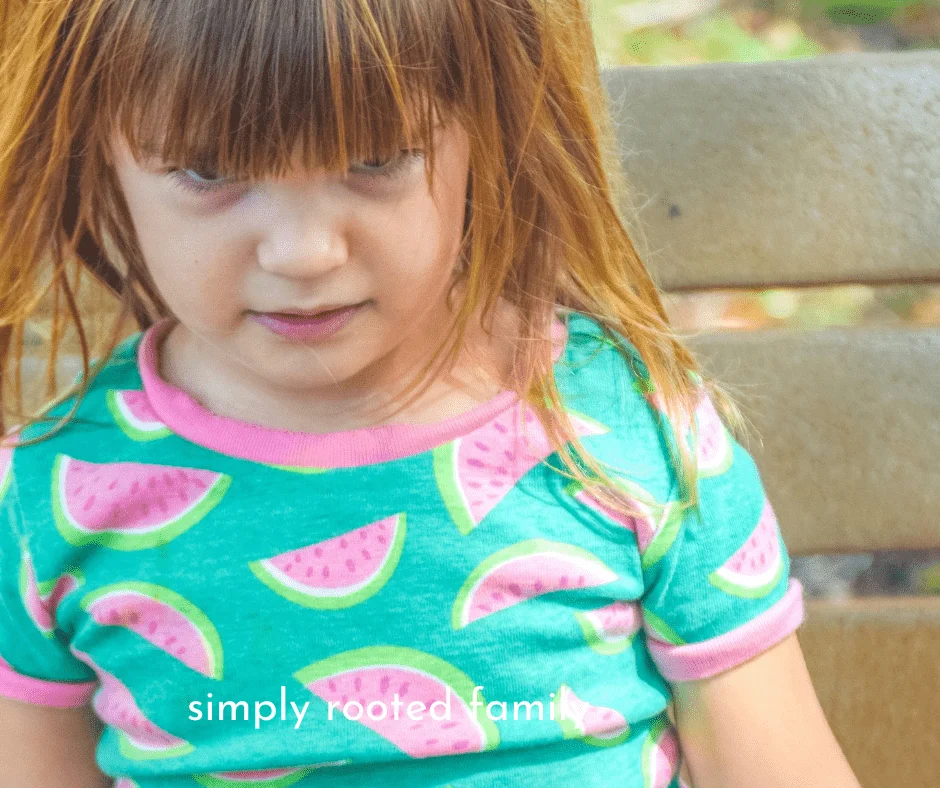Defiant behavior in your child will undoubtedly result in frequent power struggles and temper tantrums. This makes a positive parent-child relationship feel like a pipedream. These tips on how to discipline a defiant child will help you handle defiant behavior in young children and school-aged children.
My daughter and I have an interesting relationship.
I try my best to parent her with a mix of love and discipline, and she stares me blank in the face and tells me “No” if she doesn’t agree with what I say. The expression she wore was, figuratively speaking, a big middle finger, aimed right at me.
If you have a naturally strong willed or defiant child like mine, the majority of the discipline advice floating around may feel like garbage to you.
Gentle discipline may seem like a laughable term when you faced with oppositional behavior in defiant kids.
And positive reinforcement may feel anything but positive.
Luckily, with a little education and creativity, there are ways that we can peacefully parent and discipline defiant children.

What Causes a Child to Rebel?
As parents, we can’t expect exceptionally good behavior from our children at all times. Children are learning their place in the world and how to deal with emotions.
Defiance in children is common and expected. Conflict is only natural.
There are several different reasons for a child’s defiance:
A Stand for Independence
Independence is one of the early social skills that a growing child exercises, and a common reason for a defiance.
They are simply saying, “I can do it my way!”
Children may show assertiveness at a young age. A good example of this is when a child refuses to wear the outfit the parent picked out, and they want to wear their Halloween costume, in July, instead (I can’t be the only one!).
In older children, this same fight for independence may feel more like a rebellion. A child may try to sneak to their friend’s house even if you told them no.
Learn 10 Signs of a Spoiled Teenager Here.
Grasping for Control of the Reins
Even adults feel frustrated when they don’t have control over a particular situation.
Sometimes, what may look like bad behavior is actually our kid’s way of telling us that they need an opportunity to be heard.
In younger children (like during preschool years), it may present as temper tantrums or even aggressive behavior when they aren’t able to manage a situation.
On the other hand, school-age children may rebel against authority figures (such as their teachers).
Current State of Things
It’s normal for even the most cooperative, sweet child to be defiant or argumentative from time to time.
Is your child hungry, tired, not in the mood? Learn other environmental factors and reasons that can cause a child to be argumentative.
Other life situations can impact your child’s behavior. Is your child having a hard time at school, dealing with difficult situations, or struggling with family relationships?
Related: How to Set up Kids to have a Beautiful Adulthood

Seeking Attention
Children commonly act out as a way to direct attention their way. A child’s ability (or lack thereof) to verbalize feelings can cause a lack of control and ignite frustration.
If another sibling is getting a lot of attention or parents have been busy or distracted, behavior problems may arise.
Mental Health Problems
Occasionally, defiant behavior can be a sign of something more serious, such as attention deficit hyperactivity disorder, various anxiety disorders, or other mood disorders.
If you think your child’s behavior is abnormal or that they may be struggling, contact your health care provider right away.
What is Oppositional Defiant Disorder?
Oppositional defiant disorder (ODD) is a condition characterized by persistent patterns of anger, irritability, arguing, defiance or vindictiveness towards parents and other authority figures.
According to the American Academy of Child and Adolescent Psychiatry (AACAP), symptoms of ODD may include:
- Frequent temper tantrums or anger
- Excessive arguing with adults
- Commonly questioning rules
- Blaming others for his or her mistakes or misbehavior
- Easily irritable
- Rude and hateful talking when upset
Conduct disorder is a more serious behavior disorder characterized by aggression, destruction and physical violence.
If you feel that you child may have ODD or conduct disorder, reach out to your pediatrician or school psychologist immediately.
Related: How to Peacefully Discipline Your Strong Willed Kid
How to Discipline a Defiant Child
When I used to tell my 8-year-old daughter to do her homework, she would grab her computer and play video games. She never tried to lie about it; in fact, she would do it right in front of my face.
When I learned how to set clear expectations and family rules, I was able to connect with my defiant child in new and positive ways.
Defiant or difficult children will commonly respond to these 4 positive parenting techniques:
1) Support Their Choices – but Set Limits
Provide choices for your child. If they are in control over certain decisions, they will feel heard.
With that said, you are still the parent. Provide clear limits with this in mind:
- Focus on the positive, and don’t dwell on negative behavior
- Remain consistent with your decisions and consequences
- Establish routines you child can count on
Related: How to Set the Tone by Focusing on Body Language
2) Reinforce Positive Actions with Positive Consequences
When your child displays good behavior, tell them that you are proud of them for owning their decisions and making choices.
It’s a common mistake to assume that defiant children are thick-skinned.
In reality, it is often the opposite. Most seemingly strong and stubborn children are actually highly sensitive and affection is one of their basic needs. Make sure to show affection towards them.

3) Listen. No Really – ACTUALLY Listen
When you stay calm you set the tone and become a good role model for your child. When are you are in a conflict with someone, it is crucial that you must make time for active listening.
The best thing about listening is that it can slow down the conversation and put you in a better position to understand your kid’s emotional needs.
You may also enjoy: How to Manage your Kid’s Screen Time
4) Throw out the Labels
It is important to never label young people as “bad” or label arguing as “bad behavior”.
Next time your child is arguing with you, make sure to avoid saying things like “you are being bad” or “stop acting naughty”. This can only upset your child or create a stigma in their mind that their own opinion is wrong.
Learn How to Deal with a Clingy Toddler or Child Here.
5) Remember: You are Still the Boss
It is important for a parent of a defiant child to remember that they are in charge.
It can be easy to get lost in a battle with a defiant child. The important thing to remember is to never enter into a debate with your child.
Listen to what they have to say, but calmly remind them that you are in charge, there will be no argument, and if they don’t follow the rules there will be consequences.
Learn about Natural Consequences and Positive Reinforcement here.
Final Thoughts on How to Discipline a Defiant Child
When it comes to disciplining a defiant child, you may feel unprepared to handle the challenges presented to you.
I remember thinking back to the time I left the hospital after having my daughter and why no one asked me if I was equipped to withstand years of verbal abuse from a tiny human.
Luckily, these simple parenting solutions can help you peacefully connect with your child and enjoy your beautiful rooted family life together.
If you found this helpful, share it and follow us on Facebook.


Kids Who Don't Listen Needs Parents to Make These 5 Changes Immediately - Simply Rooted Family
Wednesday 1st of June 2022
[…] Looking for other tips on how to discipline a 4 year old who doesn’t listen? Read about how to peacefully discipline a defiant kid. […]
The Top 10 Signs of a Spoiled Teenager and How to Fix the Damage - Simply Rooted Family
Thursday 5th of May 2022
[…] your health care provider or a clinical psychologist. Educate yourself on a mental disorder called oppositional defiant disorder […]
3 Powerful Steps to Take When Your Kid Says "I Hate You" - Simply Rooted Family
Thursday 28th of April 2022
[…] Parenting Tips on Raising a Defiant Kid or a Kid Who Argues A […]
How to Help an Anxious Child in 6 Practical yet Powerful Steps - Simply Rooted Family
Monday 25th of April 2022
[…] labeled my daughter as a “defiant” or “strong-willed” kid; however, her anxiety was disguised by these 5 other […]
When Socks are the Enemy and Other Overly Sensitive Child Symptoms - Simply Rooted Family
Sunday 10th of April 2022
[…] thought my child was strong-willed, defiant, or […]